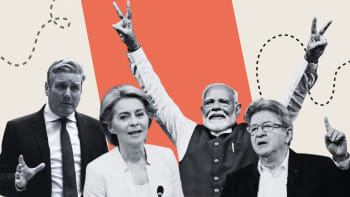A litmus test for UK’s Labour Party

The 2024 UK general election was a political earthquake. The Conservative Party was almost wiped out. In the previous election in 2019, the Conservatives won a comfortable majority, with 365 seats, well above the 326 needed to form a majority. Labour, with only 203 seats, was humiliated. It was predicted that the Conservatives would be in power for the next 10 years.
Instead, Conservatives threw their majority away. After losing his seat in 2024, Sir Brandon Lewis, a former Conservative justice secretary, accused his own party of giving the nation a "clown show" of self-indulgent infighting and posturing. There were three prime ministers in 2022 and one of them, Liz Truss, wrecked Britain's international reputation for financial competence. She broke another record by becoming, at seven weeks, Britain's shortest-serving prime minister. Voters, who frequently cited Liz Truss as their reason for wishing to remove the Conservatives, took their revenge in this election by voting her out.
The 2024 election was marked by a steely determination on the part of the electorate to eradicate the Conservatives. There was no sign of great enthusiasm for the alternatives. Knowing this, Labour leader Sir Keir Starmer ran an exceptionally cautious campaign. The two main opposition parties, Labour and Lib Dem, took advantage of the national mood by concentrating their efforts on the seats they believed they could win. In the constituencies where either Labour or the Lib Dems polled second to the Conservatives in 2019, they did not actively campaign against each other. The results indicate ruthless tactical voting by the electorate, with the Lib Dem vote falling and the Labour vote rising in potential Labour gains and vice versa in potential Lib Dem gains. This confirms that many people voted for parties they did not support in order to kick out the Conservatives. This strategic campaigning won the Lib Dems 72 seats, their best result since 1923, and Labour 412 seats, their best since 1997.
The Conservatives were also fighting on the right. In 2019, the Reform UK Party entered into an election pact under which they would not stand against sitting Conservative MPs but Nigel Farage, the Reform leader, said at the beginning of the recent campaign that the Conservative Party was unfit to rule and his party should replace them. Reform's main manifesto commitment is for tougher immigration policies. The party only won five seats, but they received 15 percent of the national vote and many Labour and Lib Dem candidates won by sailing through the split in the Conservative/Reform vote. Some prominent Conservatives believe they should become closer to the Reform Party so that they can emulate the success of Marine Le Pen's National Rally Party in France. Others argue that British elections are always won from the centre and so appeasing Reform Party voters would take them to the fringes of the far right, making them unelectable.
Though they have a commanding majority in the House of Commons, Labour's electoral support is therefore wafer thin. Few people in the UK electorate have strong party loyalties today. The Labour leadership is acutely aware that, if the Conservatives can throw away a majority, so can they. At around 60 percent, turnout was the lowest for 20 years. This reflects disillusion rather than apathy. Though disgusted with the Conservatives, voters consistently say they have little faith in any politicians to make positive change. Such low expectations may work to Labour's advantage.
In his first speech as prime minister, Starmer set himself the task of managing expectations, stressing that change cannot come quickly. Instead, he stressed a change in tone. His government would bring back the ethos of public service and show that "politics can be a force for good." If that message comes through, the electorate may trust them enough to give them a second chance at the next election to complete their task. As a demonstration of his commitment to action, he held his first Cabinet meeting on Saturday, July 6, less than 24 hours after becoming prime minister.
The new government will focus on domestic policies, restoring the National Health Service, which the new Health Secretary has described as "broken," improving care services and education, increasing the number of affordable homes, and sorting out local government finance. Their main area of domestic vulnerability is probably immigration. The Reform Party outflanked the Conservatives on this issue. If Labour finds itself on the defensive about immigration at the next election, Reform might do the same for them.
The single most important foreign policy issue for Britain is the war in Ukraine, though Gaza has taken a big space in public domain. The Russian invasion of Ukraine is widely regarded as an existential threat to UK sovereignty. On his first day as prime minister, Starmer spoke to Ukrainian President Volodymyr Zelensky. A key factor in Labour's crushing defeat in 2019 was the contempt many traditional Labour voters had for Starmer's predecessor, Jeremy Corbyn. In doorstep interviews, they consistently said that they perceived him to be an unpatriotic pacifist who was not committed to NATO and could not be trusted to defend Britain.
Pacifism brings few votes and keeping Corbyn away from the military machine helped the Conservatives win many Labour seats in 2019. This line of attack failed in 2024. Starmer has restored Labour's credibility as a party of serious government by promising to increase defence spending, confirming unwavering support for NATO and taking a leading role in confronting Russia. Labour must maintain these commitments if it wishes to remain electable.
By contrast to Ukraine, Labour's position on Gaza is an electoral liability. Corbyn has been expelled from the Labour Party but he is back in Parliament as an independent MP, along with four other independents who stood with him on a platform of solidarity with Gaza. All constituencies with substantial Muslim populations saw a fall in support for Labour, in protest against Starmer's refusal to condemn Israel's aggression against Palestine. This cost Labour two of its most prominent shadow cabinet ministers who lost their seats to independents on the Gaza ticket. As a reminder that Palestine is a progressive issue not just a Muslim concern, Starmer's own majority was cut by 18 percent by a Jewish independent standing in support of Gaza. Andrew Feinstein is the South African son of a Holocaust survivor. He who was an MP for the African National Congress under Nelson Mandela. His wife is a Bangladeshi.
Given the fragility of Labour's vote, it cannot afford to alienate Muslims and progressives who have traditionally been among its strongest supporters. The Labour manifesto commits the party to recognising a Palestinian state "as a contribution to a renewed peace process," but without stating when this might happen. Given the domestic pressures, recognition of Palestine could be done quickly and at no cost if Labour is serious about rebuilding trust in politics.
We do not know what lasting changes the 2024 electoral earthquake will make to Britain's political landscape. That will depend on the performance of the Labour Party in office and the direction the Conservatives take when they select their new leader. The question remains: will the new prime minister contribute to the international politics of conflict or reconciliation?
Dr David Cheesman is director of Equality in Diversity CIC, secretary at the United Nations Association Luton, board member of Squared Housing Association, and policy adviser on UK Financial Services Regulation.
Brig Gen (retd) Dr M Sakhawat Hussain is former election commissioner of Bangladesh and senior fellow at the South Asian Institute of Policy and Governance (SIPG), North South University (NSU). He can be reached at [email protected].
Views expressed in this article are the author's own.
Follow The Daily Star Opinion on Facebook for the latest opinions, commentaries and analyses by experts and professionals. To contribute your article or letter to The Daily Star Opinion, see our guidelines for submission.

 For all latest news, follow The Daily Star's Google News channel.
For all latest news, follow The Daily Star's Google News channel. 






Comments